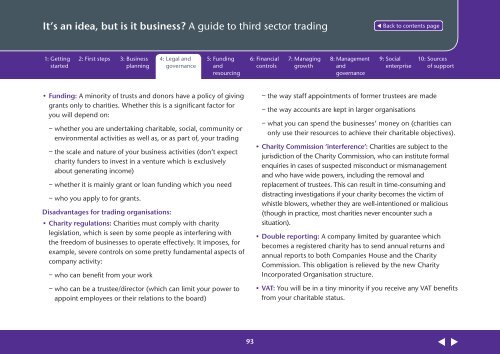A guide to third sector trading - WCVA
A guide to third sector trading - WCVA
A guide to third sector trading - WCVA
Create successful ePaper yourself
Turn your PDF publications into a flip-book with our unique Google optimized e-Paper software.
It’s an idea, but is it business? A <strong>guide</strong> <strong>to</strong> <strong>third</strong> sec<strong>to</strong>r <strong>trading</strong><br />
1: Getting<br />
started<br />
2: First steps 3: Business<br />
planning<br />
4: Legal and<br />
governance<br />
5: Funding<br />
and<br />
resourcing<br />
6: Financial<br />
controls<br />
7: Managing<br />
growth<br />
8: Management<br />
and<br />
governance<br />
9: Social<br />
enterprise<br />
10: Sources<br />
of support<br />
• Funding: A minority of trusts and donors have a policy of giving<br />
grants only <strong>to</strong> charities. Whether this is a significant fac<strong>to</strong>r for<br />
you will depend on:<br />
− whether you are undertaking charitable, social, community or<br />
environmental activities as well as, or as part of, your <strong>trading</strong><br />
− the scale and nature of your business activities (don’t expect<br />
charity funders <strong>to</strong> invest in a venture which is exclusively<br />
about generating income)<br />
− whether it is mainly grant or loan funding which you need<br />
− who you apply <strong>to</strong> for grants.<br />
Disadvantages for <strong>trading</strong> organisations:<br />
• Charity regulations: Charities must comply with charity<br />
legislation, which is seen by some people as interfering with<br />
the freedom of businesses <strong>to</strong> operate effectively. It imposes, for<br />
example, severe controls on some pretty fundamental aspects of<br />
company activity:<br />
− who can benefit from your work<br />
− who can be a trustee/direc<strong>to</strong>r (which can limit your power <strong>to</strong><br />
appoint employees or their relations <strong>to</strong> the board)<br />
− the way staff appointments of former trustees are made<br />
− the way accounts are kept in larger organisations<br />
− what you can spend the businesses’ money on (charities can<br />
only use their resources <strong>to</strong> achieve their charitable objectives).<br />
• Charity Commission ‘interference’: Charities are subject <strong>to</strong> the<br />
jurisdiction of the Charity Commission, who can institute formal<br />
enquiries in cases of suspected misconduct or mismanagement<br />
and who have wide powers, including the removal and<br />
replacement of trustees. This can result in time-consuming and<br />
distracting investigations if your charity becomes the victim of<br />
whistle blowers, whether they are well-intentioned or malicious<br />
(though in practice, most charities never encounter such a<br />
situation).<br />
• Double reporting: A company limited by guarantee which<br />
becomes a registered charity has <strong>to</strong> send annual returns and<br />
annual reports <strong>to</strong> both Companies House and the Charity<br />
Commission. This obligation is relieved by the new Charity<br />
Incorporated Organisation structure.<br />
• VAT: You will be in a tiny minority if you receive any VAT benefits<br />
from your charitable status.<br />
93












